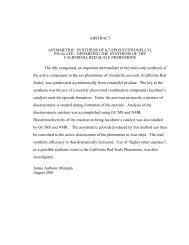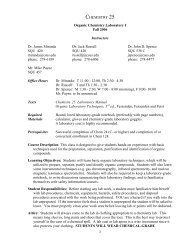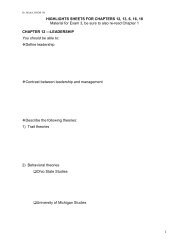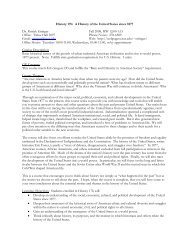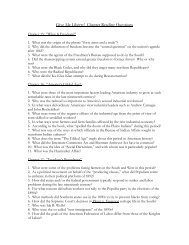STAT 115A: Introduction to Probability Theory, Section 1, Fall 2010
STAT 115A: Introduction to Probability Theory, Section 1, Fall 2010
STAT 115A: Introduction to Probability Theory, Section 1, Fall 2010
You also want an ePaper? Increase the reach of your titles
YUMPU automatically turns print PDFs into web optimized ePapers that Google loves.
<strong>STAT</strong> <strong>115A</strong>: <strong>Introduction</strong> <strong>to</strong> <strong>Probability</strong> <strong>Theory</strong>, <strong>Section</strong> 1, <strong>Fall</strong> <strong>2010</strong>Instruc<strong>to</strong>r: Dr. Coşkun Çetin (pronounced ‘Joshkun Chetin’)Office: BRH 136, (916) 278-6221Office Hours: MW 2:00-2:50 pm; R: 11:30 am-12:20 pm (or by appointment)E-mail: cetin@csus.eduWeb page: http://webpages.csus.edu/~cetin/Lecture: MWF 9:00-9:50 am, BRH 201Prerequisite: Math 31; <strong>STAT</strong> 1 or <strong>STAT</strong> 50 is recommended.Textbook (required): <strong>Probability</strong> and Statistics, by DeGroot and Schervish (third edition).Suggested: <strong>Introduction</strong> <strong>to</strong> Mathematical Statistics, by Hogg, McKean and Craig (sixth edition).Material Covered: Most of the material covered will be from the chapters 1-5 of the textbook,concentrating on the axioms of probability, discrete and continuous random variables, joint densities,expectation, moment-generating functions, Chebyshev's inequality, weak law of large numbers andcentral limit theorem. If time permits, some modern applications including simulation basedcomputations will be introduced. The first two weeks will be spent on a review of basic conceptsincluding the set theory, axiomatic foundations of probability, counting and combina<strong>to</strong>rial methods.Some additional handouts will also be provided for the related applications <strong>to</strong> supplement the textbook.Course Description: <strong>STAT</strong> 115 A-B series are the traditional upper division probability/mathematicalstatistics courses. The first semester (A) consists mostly of probability theory with emphasis on variousdistributions, techniques and their applications. The second semester (B) is generally entirely devoted<strong>to</strong> statistics itself: the theories of estimation and hypothesis testing followed by optional coverage ofparticular examples of these.Homeworks: Regular homework (HW) problems for grading will be given in class or posted on SacCTat https://online.csus.edu. You are expected <strong>to</strong> take these assignments seriously, visit me during myoffice hours for your questions and submit them promptly.GRADE EVALUATIONThe final letter score is based on a curve determined by your performance on homeworks (one possibleclass project), two midterm exams and a cumulative final exam as follows:Homeworks : 20%. Eight best out of about 9-10 HWs will count <strong>to</strong>wards the grade; no make-ups.Midterm Exams: 20%+ 20%=40%. Two best of the three tests will count; no make-ups.Final Exam: 40% (cumulative and compulsory)DATESDrops: You may drop this course without penalty until Monday September 27, <strong>2010</strong> (September 10via My Sac State). For procedural details, refer <strong>to</strong> the DROP POLICY document of the CSUS Math &Statistics department.Midterm Exams: Oc<strong>to</strong>ber 1; November 5 and December 3 (Fridays, in class)FINAL Exam: Friday, December 17, 8-10 am (in class)
Notes:1. In principle, this syllabus is tentative and is subject <strong>to</strong> change. You are responsible for any suchchanges and class announcements. Any updated version of the syllabus will be available on SacCT.2. The regular class attendance is crucial for a better understanding of the concepts but is not gradeddirectly. It is your responsibility <strong>to</strong> contact your instruc<strong>to</strong>r/classmates and check the announcements onSacCT <strong>to</strong> catch up with the missed class(es).3. If you have a specific disability that qualifies you for academic/exam accommodations, pleasecontact Disability Services and provide documentation <strong>to</strong> SSWD, Lassen Hall 1008. Please discussyour accommodation needs with me early in the semester.4. Academic honesty is expected at all times and in all the work you do in class or outside theclassroom. Cheating or plagiarism in any work turned in for a grade will result in getting grade zero inthat work for all the parties involved. Repeated plagiarism will result in your failing the course.5. It is your responsibility <strong>to</strong> assure that you are qualified <strong>to</strong> enroll in this course, e.g. the prerequisites6. Some of the examples that will be used in lectures come directly from the textbook. So, you areexpected <strong>to</strong> bring the book and/or the copies of the relevant sections/ files/ formula sheets/area tableswith you <strong>to</strong> each class meeting.



